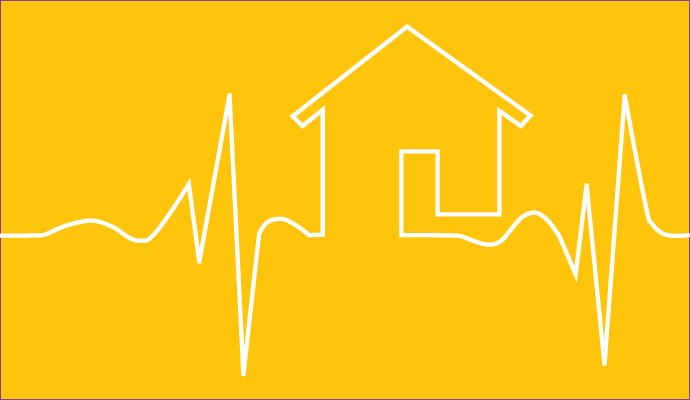CMS Hospital At Home Model Seeks to Boost Capacity During COVID-19
CMS selected 6 health systems to participate in a hospital at home model; the agency also announced a new flexibility for some ambulatory surgery centers to expand hospital capacity during COVID-19.

Source: Getty Images
- As many hospitals near capacity during another surge of COVID-19, CMS is allowing some healthcare providers to participate in a new hospital at home program that allows them to deliver acute care services outside of hospital walls.
The Acute Hospital Care At Home program announced last week will allow patients who require an acute inpatient admission to a hospital or daily rounding by a physician and a medical team to receive hospital-level care at home rather than in the hospital during the most recent surge of COVID-19, CMS explained.
Patients will be subject to strict screening protocols based on medical and non-medical factors, including working utilities, assessment of physical barriers and screenings for domestic violence concerns, and they must undergo an in-person evaluation prior to receiving care at home, the agency added.
Only patients who are admitted from an emergency department or from an inpatient hospital bed to receive hospital-level will be eligible.
The program builds on the existing Hospital Without Walls model approved in March 2020, which provided regulatory flexibilities that enabled hospitals to deliver acute care services in locations beyond existing hospital walls. The model was key to expanding hospital capacity at the start of the COVID-19 pandemic by allowing providers to separate non-coronavirus cases in outside facilities, such as ambulatory surgery centers, inpatient rehabilitation hospitals, and even non-healthcare facilities, like hotels and school dormitories.
READ MORE: Home Hospital Reduces Costs, Readmission for Acutely Ill Patients
The new hospital at home program will also seek to expand hospital capacity as COVID-19 cases surge again across the country, but this time by promoting the use of at-home care.
“We’re at a new level of crisis response with COVID-19 and CMS is leveraging the latest innovations and technology to help health care systems that are facing significant challenges to increase their capacity to make sure patients get the care they need,” CMS Administrator Seema Verma said in the announcement.
Registered nurses will evaluate qualifying patients once daily either in person or remotely, and two in-person visits will happen daily by either registered nurses or mobile integrated health paramedics to ensure the appropriateness of at-home hospital care, CMS added.
The agency anticipates the hospital at home program to allow patients to spend time with their family amid strict visitation restrictions and keep non-coronavirus patients out of hospital beds needed for infected patients.
Six health systems, including Brigham and Women’s Hospital in Massachusetts, Huntsman Cancer Institute in Utah, and Mount Sinai Health System in New York City, will be the first to participate in the Acute Hospital Care at Home program.
READ MORE: Bringing Back House Calls to Cut Spending on High-Risk Patients
“This means we can significantly scale up hospital-level services in the home, while enhancing hospital capacity for a potential surge,” Kenneth L. Davis, MD, president and CEO of Mount Sinai, said in a statement.
Research has demonstrated several benefits of hospital at home programs during normal times, including fewer hospital readmissions, reduced mortality rates, and cost savings. But during the pandemic, interest in the alternative care delivery model has exploded during the pandemic, according to the Association of American Medical Colleges (AAMC).
Health systems like Atrium Health and Mount Sinai Health System leveraged existing at-home care capabilities to deliver hospital-level care to patients within their own homes in order to conserve personal protective equipment, keep infected patients out of hospitals, address patient concerns about contracting the virus in the hospital, and free up hospital beds during COVID-19 surges, the Association reported.
The use of the model had become so popular that the American Hospital Association (AHA) urged CMS last month to expand regulatory flexibilities that enabled hospitals to deliver acute care services within patient homes.
But rules and regulations have limited how much acute care hospitals can deliver within patient homes.
READ MORE: Healthcare Revenue Cycle Recovery After the COVID-19 Pandemic
Reimbursement in-home acute care services, for example, has been a barrier to scaling hospital at home programs, says Albert Siu, MD, MSPH, chair emeritus of the Brookdale Department of Geriatrics and Palliative Medicine at the Icahn School of Medicine at Mount Sinai.
“We were able to bring hospital-level services into the homes of our patients throughout New York City, but the one obstacle we faced was, how do we pay for this? To facilitate widespread adoption, we needed a mechanism of reimbursement that would capture a larger portion of the Medicare population,” said Siu, who also led a study on the benefits of hospitalization at home care.
CMS Administrator Verma stated that the Acute Hospital Care at Home Program will “make sure that CMS regulations are not standing in the way of patient care” as health systems across the country experience capacity issues now and beyond the pandemic.
The agency expects to add more healthcare providers to the program. Providers can apply via an online portal, which allows applicants to submit the necessary information to ensure they meet program criteria for participation.
In another bid to expand hospital capacity during COVID-19, CMS also announced that ambulatory surgical centers need only provide 24-hour nursing services when there is at least one patient receiving care on-site to temporarily qualify as hospitals and delivery inpatient care for longer periods than normally allowed.
The flexibility was originally part of the Hospital Without Walls model. The latest announcement clarifies centers that are eligible to take part in the regulatory waiver.
CMS stated that the clarification will make the flexibility immediately available for 85 ambulatory surgical centers participating in the Hospital Without Walls mode, but it is available for any of the over 5,700 centers through the country.
